Top 10 Quotes from Women’s NCAAs that All Age Groupers Should Hear
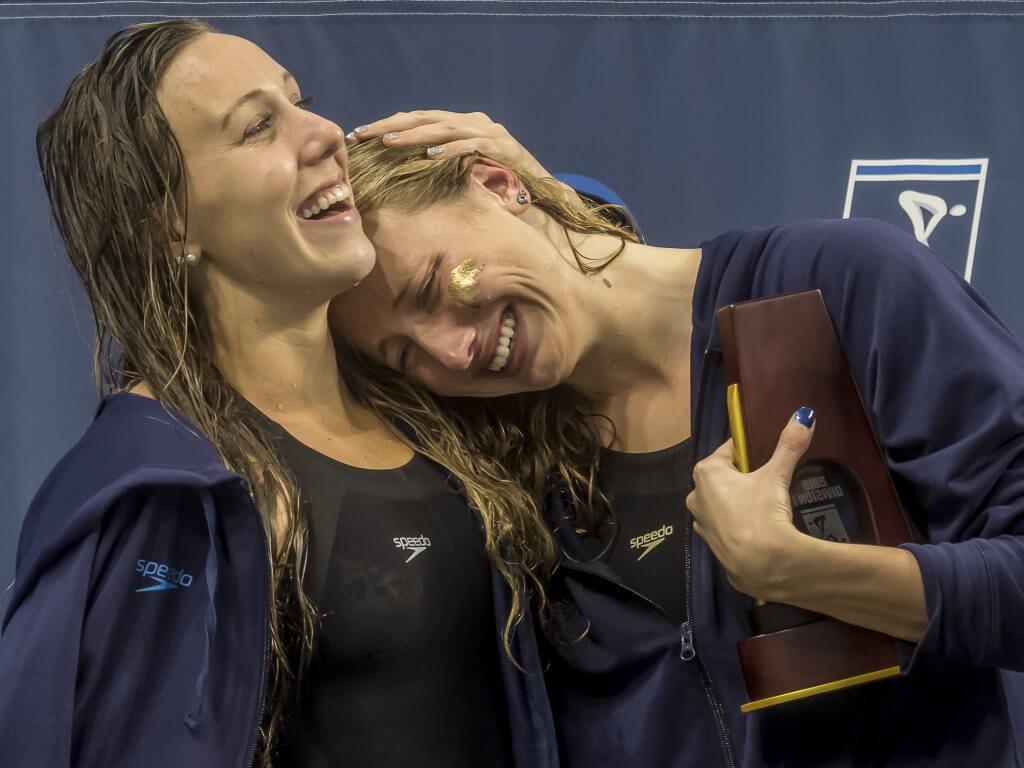
Editorial content for the 2019 NCAA DI Championship coverage is sponsored by SwimOutlet.com. See full event coverage.

The 2019 NCAA Division I Swimming & Diving Championships featured American and NCAA Records, historic ends to collegiate careers and a Stanford Cardinal three-peat as team champions. With all the glory came a series of unexpected events as well — a tough disqualification on Michigan’s Siobhan Haughey, a mid-meet injury from standout Abbey Weitzeil of Cal and more.
Throughout a series of post-race interviews, the meets’ competitors discussed all of these topics and events. Through the highs and lows, the women of the 2019 NCAA Championships provided some great wisdom for swimmers and athletes of all ages.
Everyone can learn from these elite athletes, but sometimes hearing from the country’s top swimmers can really get through to young swimmers. While 22-year-old Lilly King blasting a 55-second 100 breaststroke may seem far off for an 11-year-old competing at their first Age Group Championships, we can all learn some valuable lessons from these women:
Amy Bilquist – California (2019 NCAA Champion: 200 and 400 Free, 400 Medley Relays)
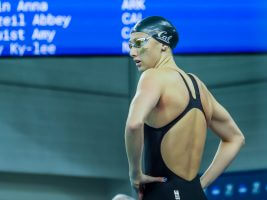
Photo Courtesy: Peter H. Bick
“I wanted to be in the ‘A’ final all four years and I finally did it. I went a best time in prelims and finals and I cannot tell you when the last time I did that was…it feels great to just come and do my best for the team.”
In an interview after the 50 Freestyle where Bilquist placed sixth, she highlights how there is always more to be proud of than just times. Yes, Bilquist recorded two personal best times in her event, but she also earned a spot in the A final and contributed points to her team. The lesson here, is that good or bad, there is more to every swim than just your time.
Beata Nelson – Wisconsin (2019 NCAA Champion: 200 IM, 100 Back, 200 Back)
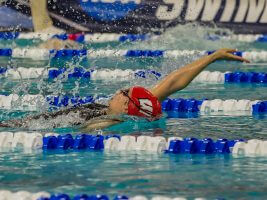
Photo Courtesy: Peter H. Bick
“I honestly had no idea where Taylor [Ruck] was or where Asia [Seidt] was or really where anyone was because I was just trying to focus on my own swim. But before, planning my race out, I knew I needed to work those last two walls, that was my strength and I needed to use that to my advantage. I pushed them as far as I could and gave it my best.”
While everyone’s race strategy is different, especially depending on what event is at hand, Nelson described how she trusted her own training and plan despite being behind for the first 150 yards of the 200 Backstroke — an event she won in new NCAA record fashion. You cannot control what anyone will do, but you can control your own race and how you plan to attack it.
Abbey Weitzeil – California (2019 NCAA Champion: 50 Freestyle, 200 & 400 Free, 400 Medley Relays)
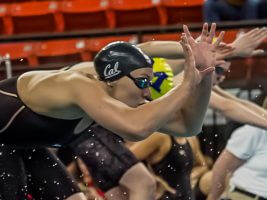
Photo Courtesy: Peter H. Bick
“I knew I could do it. At the end of this year I knew I was going twenty-point. And I didn’t. I’m really disappointed. When I first saw my time I was like ‘dang it.’ But it took me a second to realize I actually broke my American Record and I was like ‘Oh, thats pretty cool!’ You know you’re so close and I’m like well what could I have done to go .03 faster. It’s something to strive for though. It’s definitely a little bummer but I can’t be disappointed.”
When it comes to setting goals, there is nothing worse than the feeling of missing it by .01 — or in Abbey Weitzeil’s case, .03. Weitzeil addressed the disappointment of missing her goal of 20.99 in the final of the women’s 50 Freestyle. Missing goals is okay, and being disappointed in missing goals is okay. But it is also important to highlight the positive aspects of each swim. Like Bilquist’s statement, there is more to each race than just the time.
Lilly King – Indiana University (2019 NCAA Champion: 100 and 200 Breast)
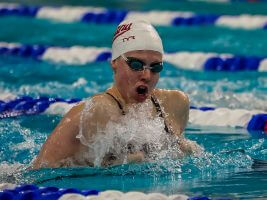
Photo Courtesy: Peter H. Bick
“I just decided to be in the mood to swim fast today and I don’t think I was quite mentally there my sophomore year. I just told myself to go and I went — pretty easy…it’s like, oh okay I guess today’s the today. I think at some point during warm-up I realized that it was my last 100 breast in college ever, and I was like okay, you know today would probably be a good day to go fast.”
It’s that easy, right? Yes, Lilly King has a unique mindset that makes her who she is. Combined with a dedicated work ethic, this mindset is pretty unbeatable – proven by her eight-for-eight NCAA career breaststroke titles. While you may not be Lilly King, she brings up a good point that sometimes swimmers overthink competitions. If you trust what you are doing, it is sometimes better to just go for it and choose to go fast.
Amy Bilquist & Abbey Weitzeil – California
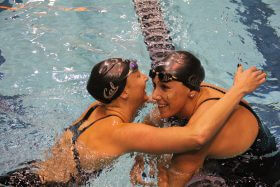
Photo Courtesy: McKenna Ehrmantraut
“We can only control what we can do. We always talk about that, control the controllables. We can’t control what Stanford does or is going to do the rest of the meet. Obviously they’re an amazing team and they’re super deep. Props to them, they’re having amazing swims too…”
Really, you should just watch the whole interview with Cal’s Bilquist and Weitzeil. Throughout their time on-camera, the two share wisdom on controlling what you can, as shown above, as well as how to turn your brain off in races. Weitzeil describes how the time to overthink is in practice, so that your body will just know what to do come race day. This is a great quote for all young swimmers to hear. How you prepare both your body and mind every day matters when it comes to the race.
Ella Eastin – Stanford (2019 NCAA Champion: 400 IM, 800 Free Relay)
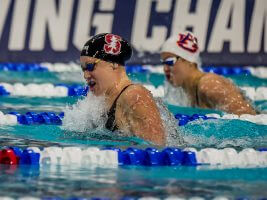
Photo Courtesy: Peter H. Bick
“I try to think as much as possible about my race plan while I’m swimming. It’s the most painful race that I get to swim and I think that taking it lap by lap and thinking about the breakdown of my race while I’m doing it is definitely something that helps.”
We can learn a lot from Ella Eastin. While her interview is full of wisdom, the statement that stood out the most was that she “gets” to swim the 400 IM. She does not “have to” swim it. The language we use can truly affect our day-to-day performance and mentality. Sure, it’s a pretty painful race and arguably one of the toughest there is. Whether it is a 50 backstroke on a medley relay or the finals of the 400 IM, Eastin takes each race as an opportunity to progress and get better.
Siobhan Haughey – Michigan (2019 NCAA Runner-Up: 200 and 400 Free Relays)
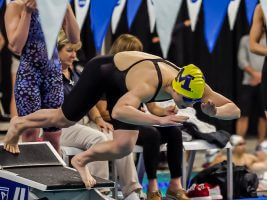
Photo Courtesy: Peter H. Bick
“It didn’t really turn out the way I wanted it to. And about that disqualification, it’s really not what I was expecting and I don’t really think it was a fair judgement. Our coaches didn’t argue against that but it is what it is. I can’t really control that. I know the best thing for me and the team to do is just to move on and focus on the rest of the races that we had.”
For those are unaware, Michigan’s Siobhan Haughey was disqualified in the preliminaries of the 200 IM, an event where she had the fourth seed coming into the meet. As the Wolverines were aiming for a top-three finish, Haughey’s individual races were of high importance. Haughey and her team handled the disappointment with grace and grit. The event made them even more motivated to earn big points on relays. Perhaps cliche, but how you handle adversity speaks more to your career than how fast you ever swam.
Delaney Duncan – Eastern Michigan University (2019 NCAA Runner-Up: 100 Breast)
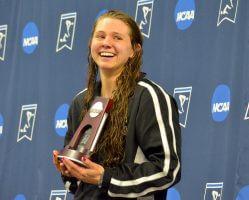
Photo Courtesy: Dan D’Addona
“Just more determination and more focus. Going from sophomore to junior year I kind of had a chip on my shoulder and this year I was lot more confident in myself. I swam more for myself than to prove things to other people. So I was lot more focused and determined in and out of the water, especially in the weight room.”-
Between countless hours in the pool, weight room and commuting to practices and meets, it is easy to put pressure on yourself. Your family donates so much of their time, and you appreciate all of the efforts put in by your coach. Additionally, the better you get, the more pressure there is. It is easy to fixate on team records, awards and even just proving that you are still getting better. Duncan reminds us that sometimes you need to just swim for yourself. At the end of the day, you are the one fixing your technique, training hard and taking care of your body. Your opinion about yourself matters more than anyone else’s.
Mallory Comerford – Louisville (2019 NCAA Champion: 100 and 200 Freestyle)
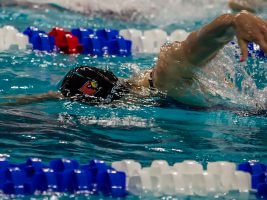
Photo Courtesy: Peter H. Bick
“This week has been, obviously this whole meet is always up and down and I think our team has experienced that. We’re just trying to be better each day, better each session, each race. Having that “next” mindset. If one thing goes good, great — but you need to move on to the next thing. And if something goes bad – move on to the next thing. I try to portray that as much as possible for my team, bring them along with me and keep battling for that trophy.”
We’ve all heard of growth and fixed mindsets. The difference is quite simple – one allows you to keep pushing forward and one may prohibit you from doing so. Comerford explains the “next” mindset in her interview after a historic 200 Freestyle victory. The best swimmers are in control of their emotions. She summed it up perfectly: If one thing goes good, great – but you need to move on to the next thing. And if something goes bad – move on to the next thing. Happiness, sadness and disappointment are all normal emotions that will ultimately help you get better. But spending too much time on either side could have reverse results. The ability to do this is what separates the good swimmers from the great.
All interviews from the 2019 NCAA Division I Swimming & Diving Championships can be found on Swimming World’s YouTube page.
All commentaries are the opinion of the author and do not necessarily reflect the views of Swimming World Magazine nor its staff.

- LIVE RESULTS
- LIVE STREAM (PRELIMS)
- LIVE STREAM (FINALS)
- PSYCH SHEET
- WOMEN TEAM INVITES
- WOMEN RELAY ENTRIES
- WOMEN DIVERS
- 2018 WOMEN'S NCAA RESULTS
- 2017 WOMEN'S NCAA RESULTS
- 2016 WOMEN'S NCAA RESULTS
- ALL COLLEGE NEWS
- OFFICIAL NCAA PAGE
- LINK TO 2019 MEN NCAA DI CHAMPIONSHIPS
- SWIMOUTLET.COM 2019 TECH SUIT REVIEW
- PREDICTIONS (PART 1)
- PREDICTIONS (PART 2)
- 2019 COMPLETE RESULTS




Wow! So true❤️
Lots of good advice here, for older swimmers as well as age groupers. I’m glad to hear that even Ella Eastin thinks the 400 IM is painful. It was my best masters event when I was in my 30s, but I had to give it up when I got into the 60s because, while the mind was still willing, the body was not. The 200 fly at the start just got to be too much to recover from. But there are still some people in my 75-79 age group still competing in it, bless their souls (and bodies).—Sandy Thatcher, Texas Ford Aquatics
Jessica Coughlin-Giammattei, share with your kiddos! My former coaches’ daughter wrote this article ??♀️ ❤️
Thanks!